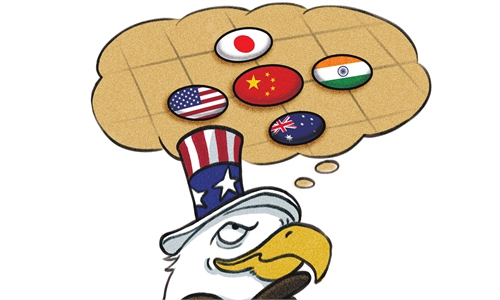
Illustration: Liu Rui/GT
The foreign ministers of the US, Japan, India and Australia held a meeting in Tokyo on October 6. Japanese Prime Minister Yoshihide Suga said it was extremely important to establish a "free and open Indo-Pacific" at a time when the world is facing the challenge of the COVID-19 pandemic. But the so-called China threat remained at the core of their dialogue.
This rare offline diplomatic conference was the first major diplomatic talk of its kind hosted by the new Japanese government. This reflects the continuity of Japan's foreign policy. Meanwhile, the meeting was held against the backdrop of deteriorating relations of Washington, Canberra and New Delhi with Beijing.
The US is still the main driving force of the QUAD. The first dialogue between the four countries took place in 2004, but later this mechanism almost ceased. After 2012, with the gradual rise of China-US tensions and changes to China's domestic and foreign policies, the US call for the establishment of an anti-China camp has continued to be echoed by the other three countries - jump-starting the four in 2017.
US Secretary of State Mike Pompeo has canceled other visits but maintained his trip to Tokyo this time not only to deal with China, but also to work on the bottom line with new Japanese government's foreign policy. Japan's new prime minister Suga continues Abe's vision of a "free and open Indo-Pacific," which pleases the US.
Japan's proposition mainly includes two points. First, the vision for the Indo-Pacific region is to realize the development of the rule of law and free navigation in the region. Second, Japan is aware that the era of the US being the world's most dominant country is coming to an end. This means that the unilaterally-led security mechanism of the US is gradually failing. A more inclusive multilateral security mechanism is needed to maintain regional stability and security.
The US wants an Asian version of NATO to contain China. Compared with the US, the other three countries have tried to down play the anti-China elements of the QUAD. They seem more willing to emphasize the active and constructive nature in it.
Australia views China more out of differences in values than specific strategic threats and conflicts of interests. Japan's considerations are more complicated. It needs the help of other countries to compete with China. Yet Tokyo is not willing to be a real enemy of China for economic reasons.
Japan and China are geographically closer too. Being an enemy of China will thwart Japan's international position in front of the US, and it will also weaken the strategic autonomy Japan has finally acquired.
Compared with Japan and Australia, India's enthusiasm for participating in the QUAD is more time-sensitive because of its border friction with China. New Delhi is trying to increase the pressure on Beijing by means of a closer and organized mechanism and force China to make concessions to India on border issues.
The four countries have seriously considered the strategic possibility of jointly dealing with China. China needs to consider and respond seriously. This involves three aspects.
The first is the relationship between China and the US. The relationship of strategic competition between a hegemonic power and an emerging power is a classic issue that China cannot avoid. However, China can exert its own influence in regards to the intensity and mode of the game.
The second matter is the relationship between China and regional order. A free, open and inclusive regional order conforms to the overall landscape of China's reform and opening-up. China should strongly support this concept.
The third aspect should focus on being more scientific in terms of positioning the relationship between China and the world, especially in terms of values.
Socialism with Chinese characteristics, rooted in the fertile soil of Chinese culture, is the latest achievement of the localization of Marxism in China. It draws on the beneficial experience of modern Western market economics. This not only has Chinese characteristics, but is also in line with the world's mainstream values.
In this sense, contemporary China is both Eastern and Western, both Chinese and foreign.
China should emphasize its commonness with Chinese characteristics in world civilization.
Only in this way will the US efforts to establish an anti-China alliance system under the banner of "differences in value and culture" not be widely recognized and supported. Then China can change the current unfavorable situation.
The author is a professor of the Center for American Studies at Fudan University and director of the Center for South Asian Studies.
The article was translated by Zhang Yuzheng of East China Normal University.

